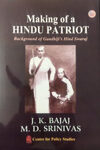Bharatiya Chitta Manas and Kala
Notes
Notes
Chapter II
1. During his remarks at the bicentennial celebrations at the Smithsonian Institution, Washington DC (U.S.A.) on November 17, 1965, Claude Levi-Strauss explained the nature of anthropology in the following words (Current Anthropology, Vol. 7, No.2, April 1966, pp. 126):
“Anthropology is not a dispassionate science like astronomy, which springs from the contemplation of things at a distance. It is the outcome of a historical process which has made the larger part of mankind subservient to the other, and during which millions of innocent human beings have had their resources plundered and their institutions and beliefs destroyed, whilst they themselves were ruthlessly killed, thrown into bondage, and contaminated by diseases they were unable to resist. Anthropology is daughter to this era of violence: its capacity to assess more objectively the facts pertaining to the human condition reflects, on the epistemological level, a state of affairs in which 1 part of mankind treated the other as an object.
A situation of this kind cannot be soon forgotten, much less erased. It is not because of its mental endowments that only the Western world has given birth to Anthropology, but rather because exotic cultures, treated by us as mere things, could be studied accordingly, as things. We did not feel concerned by them whereas we cannot help their feeling concerned by us. Between our attitude toward them and their attitude toward us, there is and can be no parity.
Therefore, if native cultures are ever to look at anthropology as a legitimate pursuit and not as a sequel to colonial era or that of economic domination, it cannot suffice for the players simply to change camps while the anthropological game remains the same. Anthropology itself must undergo a deep transformation in order to carry on its work among those cultures for whose study it was intended because they lack written record of their history.
Instead of making up for this gap through the application of special methods, the new aim will be to fill it in. When it is practiced by members of the culture which it endeavours to study, anthropology loses its specific nature and becomes rather akin to archaeology, history, and philology. For anthropology is the science of culture as seen from the outside and the first concern of people made aware of their independent existence and originality must be to claim the right to observe themselves, from the inside. Anthropology will survive in a changing world by allowing itself to perish in order to be born again under a new guise.”
Chapter III
2. Valmiki Ramayana, Aranya Kanda, Chapter 9&10. The quotations are from Hari Prasad Shastri translated, The Ramayana of Valmiki, Shanti Sadan, London, 1957, Vol. II, pp. 19-20.
3. Mahabharata, Santi Parva, Chapter 188, and Narada Purana, II.43.53-60. The quotations are from Ganesha Vasudeo Tagare translated, The Narada Purana, Motilal Banarasi Dass, Delhi, 1981, pp. 519.
Chapter IV
4. The narration relating to Sambuka in the Uttarkanda of the Valmiki Ramayana perhaps symbolizes the origin of the first Sudra and of the Sudra’s aspiration to enter Svarga, heaven of the Devas, but along with his body, of which even a Brahmana was said to be incapable of; hence the destruction of Sambuka by Sri Rama. The dialogue between Bhrigu and Bharadvaja also seems to suggest some similar aspiration by those who at about this stage or a little later began to be termed Sudras. See, The Ramayana of Valmiki, cited earlier, Vol. III, pp. 582-583; and Narada Purana, cited earlier, especially, II.43.69&70, pp.521.
Chapter V
5. For example, one of the Alankara Sastra texts, Kavyadarsa defines the permissible subjects of a Maha-Kavya, an epic, in the following words:
“It [the Maha-Kavya] has its source in a story told in the Itihasas or other good (true) material. It deals with the fruit (or goal) of the four kinds (Dharma, Artha, Kama and Moksha). It has a great and generous person as the hero. It is embellished with descriptions of the cities, oceans, hills, the seasons, the moonrise, the sunrise, of sport in the garden and of sport in the waters, of drinking scenes, of festivals, of enjoyment (love), of separation (of lovers), of (their) marriage and (their) nuptials and birth of princes, likewise, of consultation with the ministers, of sending messengers or ambassadors, of journeys (royal progress), of war and the hero’s victories; dealing with these at length and being full of Rasa (flavour) and Bhava (suggestion): with Sargas (chapters) which are not very lengthy and which are well-formed with verse measures pleasing to the ear; everywhere dealing with a variety of topics (in each case ending each chapter in a different meter). Such a poem being well-embellished will be pleasing to the world at large and will survive several epochs (Kalpas).”
It is obvious that ordinary persons and their routine day-to-day occupations cannot be the subject of high literature that is so precisely defined and elaborately circumscribed. A similar view of literature seems to have been held in Europe also till recent times.




